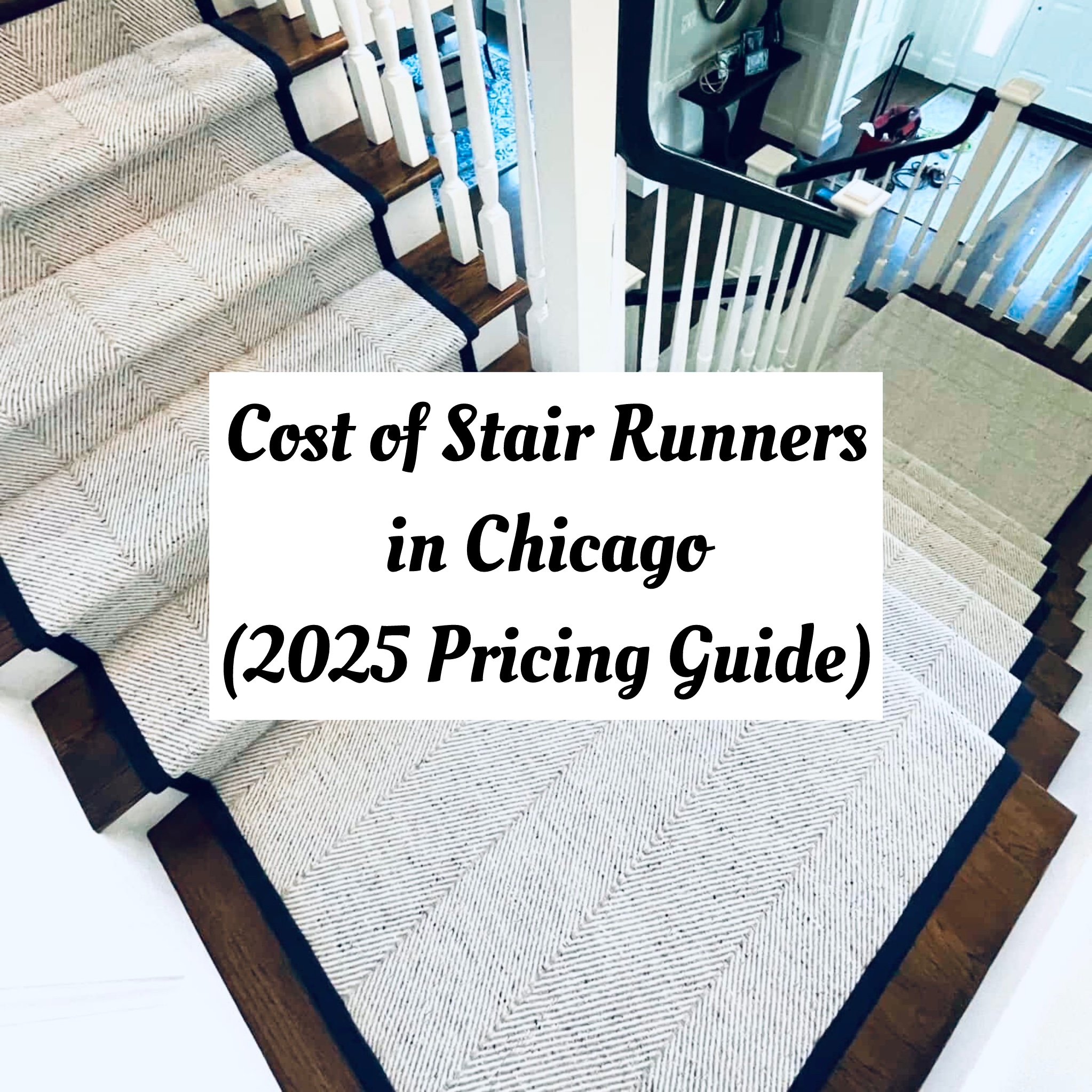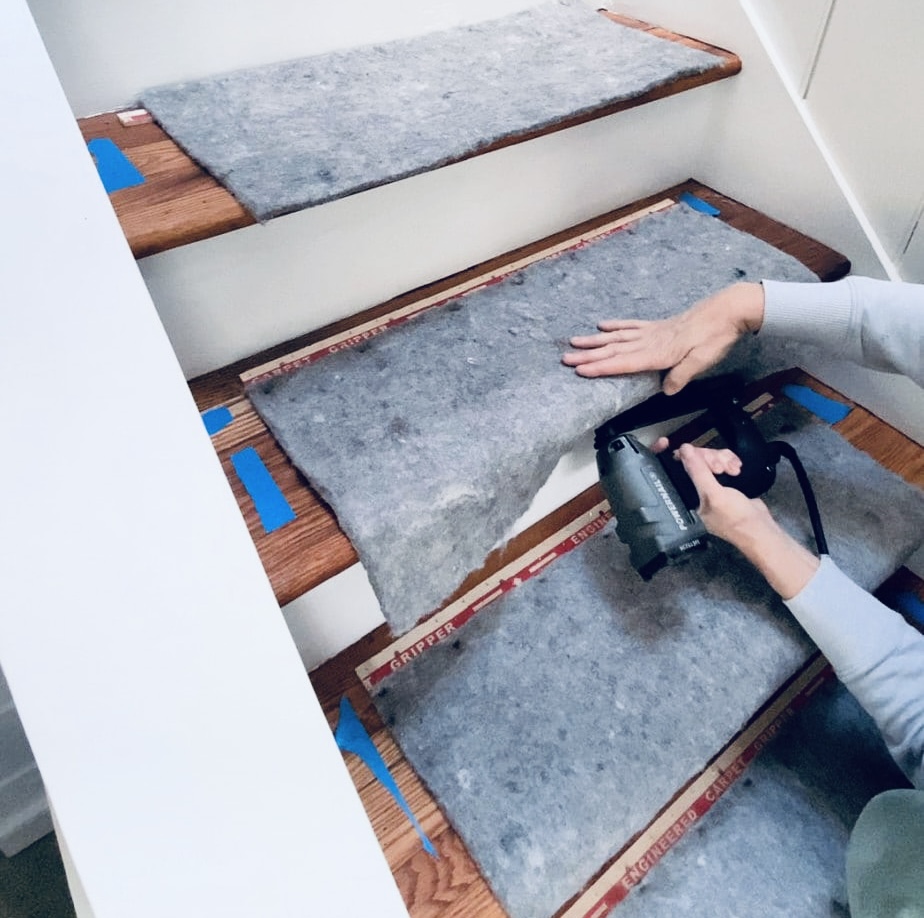How Much Does a Stair Runner Cost in Chicago? (2025 Pricing Guide)
A staircase is more than just a way to get from one floor to another; it’s a central architectural feature of your home. A beautiful stair runner can transform this functional space into a stunning design statement. Beyond the visual appeal, runners offer profound functional benefits: the clatter of footsteps softens to a hushed tread, slippery wooden steps become safer and more secure, and your hardwood is protected from daily wear and tear.
But what is the real investment for such a significant upgrade? If you’re a homeowner in Chicago or the North Shore, you know that quality comes with a price tag. The cost of a stair runner can vary significantly based on a multitude of factors. This comprehensive guide will break down the pricing of stair runners, helping you budget effectively and make an informed decision for your home.

Key Factors Influencing Stair Runner Pricing
Understanding what drives the cost is the first step. The final price on your quote is a combination of the materials you choose, the complexity of your staircase, and the labor involved.
1. Material Type: The Heart of the Runner
The fiber used to construct your runner is the single biggest factor in its cost, look, and longevity.
- Natural Fibers (Wool, Sisal, Jute): Wool is the undisputed champion of stair runners. It is exceptionally durable, naturally resilient to crushing, flame-retardant, and hides soil remarkably well. Its luxurious feel and rich appearance come at a premium price. Other natural fibers like sisal and jute offer a beautiful, organic texture but may be less soft and harder to clean, occupying a mid-to-high price range.
- Synthetic Fibers (Nylon, Polyester, Olefin): These man-made options are generally more affordable. Nylon, in particular, is an excellent choice for stairs due to its exceptional durability and resistance to abrasion, making it ideal for high-traffic homes. Polyester offers great stain resistance and vibrant color options at a budget-friendly price point, though it may not have the same long-term resilience as wool or nylon.
2. Runner Style and Design
Like any piece of decor, the complexity of the design affects the price. A simple, solid-color runner will cost less than one with an intricate, woven pattern. Custom patterns, designer brands, and premium finishes like hand-serging (a hand-sewn edge) will increase the overall cost compared to a standard machine-finished edge.
3. Staircase Configuration
Not all staircases are created equal. The shape and layout of your stairs are major factors in the cost of labor and the amount of material needed.
- Straight Staircases: A simple, straight flight of stairs is the most straightforward and least expensive to cover.
- Complex Staircases: Stairs with landings, curves, turns, or pie-shaped (winder) steps require significantly more labor. Each turn and angle requires precise measurement, cutting, and upholstery work to ensure the pattern remains aligned and the runner is secure. This meticulous work naturally increases the installation cost.
4. Width and Length Requirements
Stair runners are typically sold by the linear foot. The total length needed for your project is a primary cost driver. To calculate this, you’ll need to measure one tread (the flat part you step on) and one riser (the vertical part) and multiply by the number of stairs. Furthermore, the width of the runner matters. Standard widths are often 27 or 31 inches, but choosing a custom width from a broadloom carpet will involve more material and fabrication costs.
5. Installation Complexity
Professional installation is highly recommended for a flawless and safe result. The installer’s fee is based on the staircase’s complexity. A simple “waterfall” installation (where the carpet flows directly down the riser) on a straight staircase is standard. A more tailored “Hollywood” installation (where the carpet is wrapped tightly around the nose of each tread) is more labor-intensive and costs more. As mentioned, curves and landings are the most complex and will be at the higher end of the labor spectrum.
Average Cost Breakdown in the Chicago Area
To give you a clearer picture, here are some typical costs you can expect. (Note: These are estimates and can vary based on the factors above).
Material Costs:
- Standard Roll Runners: Entry-level synthetic roll runners (typically 27″ wide) can start at approximately $29.99 per linear foot. For an average straight staircase of 13 steps, you’ll need about 23 linear feet. This brings the initial material cost to around $690, excluding padding and labor.
- Custom Broadloom Runners: For a more tailored look, a runner can be cut from a larger roll of broadloom carpet. The starting cost for the material alone can be $499 and up, before factoring in cutting, finishing the edges, and installation.
Installation Costs:
- Straight Staircase: Professional labor for a straight staircase in the Chicagoland area typically ranges from $350 to $550.
- Complex Staircase: For a staircase with a landing, turn, or winder steps, expect installation costs to range from $550 to $850 or more, depending on the intricacy.
Additional Expenses:
- Carpet Padding: High-quality padding is essential for comfort, noise reduction, and extending the life of your runner. Expect to pay around $165 for an average staircase.
- Binding Edges: To prevent fraying, the edges of the runner must be professionally bound or serged. This service costs approximately $180.
Total Estimated Project Cost:
Considering all these variables, a complete, professionally installed stair runner project can range from $1,500 for a straightforward project with budget-friendly materials to upwards of $2,000 to $5,000 for high-end materials like wool on a complex staircase.
Click HERE to view a video of how we install stair runners!
Cost-Saving Tips
- Opt for Roll Runners: Pre-finished roll runners are often more economical than creating a custom runner from broadloom carpet.
- Consider DIY (With Caution): If you have extensive carpeting and upholstery skills, a DIY installation can save you the entire labor cost. However, mistakes can be very costly, potentially ruining the material. For most homeowners, the pristine finish of a professional job is worth the investment.
- Compare Quotes: Always get a few detailed quotes from reputable suppliers. Ensure the quote clearly breaks down the cost of materials, padding, labor, and any additional finishing charges.
The Right Investment for Your Home
Choosing a stair runner is an investment in your home’s safety, comfort, and style. The final cost depends heavily on your material choice and the complexity of your staircase. By understanding these key factors, you can better assess your specific needs and align them with your budget.
To truly understand the possibilities and get an accurate price for your unique staircase, the best step is to consult with an expert. If you’re in the Chicago or Evanston area, we invite you to our showroom. At Rouzati Rugs, we can guide you through our extensive collection and provide a personalized quote to help you achieve the beautiful, safe, and quiet staircase you envision.

